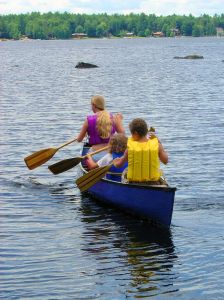Playdates…sleepovers…camping…overnight trips…Most parents probably don’t think about these events the way a parent who’s child suffers from food allergies does. The only time my son has spent away from us is with his grandparents. And while he’s still young, one day he’ll be old enough to spend a day or a night away from us. While I hope that he’s outgrown his allergies when that time comes, the reality is that he may not.
I recently co-hosted a second online Food Allergies class with The Motherhood, Divvies, and several bloggers and experts who have experience in the subject matter. The topic at hand…Navigating Food Allergies: At Camp, on Sleepovers and Playdates. To be honest, I haven’t really thought through those situations. My son is only under the care of a few people…my parents, my husband’s parents, and his preschool. The thought of leaving him with someone who doesn’t understand his allergies is unnerving. Can I trust someone else to ensure his safety? Is it even fair to ask someone else to take on that type of responsibility?
Lori Sandler, who founded Divvies Bakery, Renee Flax of the American Camp Association, Sandy Rubenstein of Camp Wingate*Kirkland and Abby Shapiro of Campsource offered some very helpful tips that might make it just a little easier for parents like myself to let go and let their children enjoy some time away from mom and dad. If you visit the class site, you’ll find a phenomenal list of resources and information to guide your decision-making.
One of the most important things to remember about sending a child to an unfamiliar place is to educate the caregivers. One of my concerns has been burdening another parent with the responsibility of keeping my son safe. Open communication and availability can do much to alleviate any concerns the caregiver may have. I have also thought about feeding my son before a playdate and then providing appropriate snacks that he can eat if he were to get hungry to mostly avoid the issue since most playdates are focused around food. Lori offers these tips for playdates:
- Be aware of your child’s comfort with where he is with his food allergies as you publicly discuss them.
- Be sure you and your child trust your child’s friend’s parents to take excellent care of your child.
- Make sure whoever is in charge knows about your child’s food allergies and emergency procedures. Teach parents/caregivers how to use an Epi-Pen if needed.
- Provide a written list of unsafe foods/ingredients.
- Provide several emergency contact numbers.
- Ask to see what foods may be offered and read ingredient labels. Inquire about cross-contact with an allergen if a food container has been previously opened
- If appropriate, based on age, make sure your child understands his food allergies including unsafe ingredients, foods, how to read labels, and where medications are kept.
- Have your child practice how to approach an adult for help.
- Talk about how to deal with peers (supportive and unsupportive).
- Acknowledge and respond when your child is self-advocating directly to you…this will boost his confidence.
- Be reachable by phone.
- Whether on a play date or a sleepover, send along some of your child’s favorite snacks and ensure you bring enough to share with everyone.
Many of the tips Lori provided can also be applied to sleep-overs and overnight camps. One of the first things a parent can do is begin the process of researching camps. Should you opt for a traditional camp or an allergen-free camp? It truly depends on your child’s allergy and it’s severity. My son does not have a nut allergy, however, many allergen-free camps are nut free. In our situation, an allergen-free camp may not avoid those foods that my son is allergic to. A phone call or even an in-person interview may be warranted so that you and your child are comfortable with the camp. Lori provides some helpful tips for camps and sleepovers:
Sleep away camp is your child’s home away from home so he/she must feel physically and emotionally safe.
- Does the camp support the philosophy that your child should always feel like the great kid he is, and not the “boy/girl with a food allergy”?
- Does your child feel a connection with the camp? Kids have to feel good about where they are.
- Does your child feel totally comfortable with and believe they are welcome to approach counselors, nurses, kitchen staff, owners with any concerns regarding food allergies at any time?
- Do you understand and feel comfortable with the camp’s philosophy and procedures, especially regarding food allergies?
- Is the camp’s model such that everyone eats the same foods; or do campers with food allergies eat separate foods?
- Can you send your own foods including care packages containing food?
- Are the activities and art projects safe and free from allergens?
- In case of an emergency, how close is an ambulance to camp and trip destinations?
- Are all staff members trained in using an Epi-Pen?
The entire panel of hosts offered so many useful tips and I came away feeling empowered and confident about what to do when my son does reach the age where he’ll be going on play-dates, sleep-overs, and overnight trips without me. I only highlighted some of the information presented during the class. I highly encourage you to bookmark the class and reference it as you navigate food allergies away from home.
This is part of a compensated campaign. The class is sponsored by ConAgra and hosted by TheMotherhood.

- Discover Luxury at Sonesta Irvine: Your Ideal Staycation - August 8, 2024
- CHOC Walk Returns to the Disneyland Resort – Special Events and Ways to Support - June 28, 2023
- Beastly Ball Returns to the Los Angeles Zoo - May 8, 2023


Leave a Reply